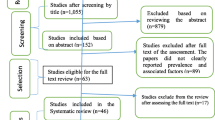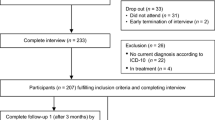Abstract
The elements and intensity of case management (CM) practices should be established according to patients’ needs. Therefore, greater understanding of patients’ needs in such community-based programmes is essential. This paper addresses this issue by characterizing two groups of patients receiving CM or a standard treatment programme (STP) and identifying the characteristics of patients receiving CM services. We recruited 241 patients with schizophrenia from 10 Adult Mental Health Centres in Barcelona (Catalonia, Spain). We analyzed the profile of new patients included in a clinical, non-intensive CM program against that of patients in a STP. CM patients, compared with STP patients, have a lower educational level and quality of life; greater use of health care services, and higher levels of psychiatric symptoms, disability and unmet needs. Community psychiatric visits, social services, education, physical health and needs were significantly associated with CM services. This study may help in identifying patients’ needs and strengthening the CM programme.
Similar content being viewed by others
References
Acil, A. A., Dogan, S., & Dogan, O. (2008). The effects of physical exercises to mental state and quality of life in patients with schizophrenia. Journal of Psychiatric and Mental Health Nursing, 15, 808–815.
Alonso Suárez, M., Bravo-Ortiz, M. F., Fernández-Liria, A., & González-Juárez, C. (2011). Effectiveness of Continuity-of-Care Programs to reduce time in hospital in persons with schizophrenia. Epidemiology and Psychiatric Sciences, 20, 65–72.
American Psychiatric Association. (1994). Diagnostic and statistical manual of mental disorders (4th ed.). Washington, DC: American Psychiatric Association.
Beecham, J. (1994). Collecting information: The client services receipt interview. Mental Health Service Research, 1, 6–8.
Bellón Saameño, J. A., Delgado Sánchez, A., del Castillo, J., & Lardelli Claret, P. (1996). Validez y fiabilidad del cuestionario de apoyo social funcional DUKE-UNC-11. [Validity and reliability of the Duke-UNC-11 questionnaire of functional social support]. Atención Primaria, 18, 153–163.
Bond, G. R., McGrew, J. H., & Fekete, D. M. (1995). Assertive outreach for frequent users of psychiatric hospitals: A meta-analysis. The Journal of Behavioral Health Services & Research, 22, 4–16.
Broadhead, W. E., Gelbach, S. H., Degruy, F. V., & Kaplan, B. H. (1988). The Duke-UNC functional social support questionnaire: Measurement of social support in family medicine patients. Medical Care, 26, 709–723.
Burns, T., Catty, J., Dash, M., Roberts, C., Lockwood, A., & Marshall, M. (2007). Use of intensive case management to reduce time in hospital in people with severe mental illness: Systematic review and meta-regression. British Medical Journal, 335, 336–340.
Burns, T., Fioritti, A., Holloway, F., Malm, U., & Rössler, W. (2001). Case management and assertive community treatment in Europe. Psychiatric Services, 52, 631–636.
Dieterich, M., Irving, C. B., Park, B., & Marshall, M. (2010). Intensive case management for severe mental illness. Cochrane Database of Systematic Reviews, 10, Art. No.: CD007906. doi:10.1002/14651858.CD007906.pub2.
Endincott, J. (1976). The Global Assessment Scale: A procedure for measuring overall severity of psychiatric disturbance. Archives of General Psychiatry, 33, 766–771.
Field, A. (2005). Discovering statistics using SPSS (2nd ed.). London: SAGE Publications Ltd.
Gorey, K. M., Leslie, D. R., Morris, T., Carruthers, W. V., John, L., & Chacko, J. (1998). Effectiveness of case management with severely and persistently mentally ill people. Community Mental Health Journal, 34, 241–250.
Gutiérrez-Recacha, P., Chisholm, D., Haro, J. M., Salvador-Carulla, L., & Ayuso-Mateos, J. L. (2006). Cost-effectiveness of different clinical interventions for reducing the burden of schizophrenia in Spain. Acta Psychiatrica Scandinavica. Supplementum, 432, 29–38.
Haro, J. M., Salvador-Carulla, L., Cabases, J., Madoz, V., & Vázquez-Barquero, J. L. (1998). Utilisation of mental health services and costs of patients with schizophrenia in three areas of Spain. British Journal of Psychiatry, 173, 334–340.
Harvey, P. D., & Penn, D. (2010). Social cognition: the key factor predicting social outcome in people with schizophrenia? Psychiatry (Edgmont), 7, 41–44.
Herdelin, A. C., & Scott, D. (1999). Experimental studies of the program of assertive community treatment. A meta-analysis. Medical Care Research and Review, 10, 53–89.
Janca, A., Kastrup, M., Katschnig, H., López-Ibor, J. J., Mezzich, J. E., & Sartorius, N. (1996). The World Health Organization Short Disability Assessment Schedule (WHO DAS-S): A tool for the assessment of difficulties in selected areas of functioning of patients with mental disorders. Social Psychiatry and Psychiatric Epidemiology, 31, 349–354.
Jiménez-Estévez, J. F., Moreno-Kustner, B., & Torres-González, F. (1997). Evaluación de necesidades en enfermos mentales crónicos: el cuestionario de Camberwell. [Evaluation of needs of chronically mentally ill: the Camberwell Assessment of Needs Questionnaire]. Archivos de Neurobiología, 60, 113–124.
Kanter, J. K. (1989). Clinical case management: Definition, principles and components. Hospital & Community Psychiatry, 40, 361–368.
Kay, R. S., Fiszbein, A., & Opler, L. (1987). The Positive and Negative Syndrome Scale (PANSS) for schizophrenia. Schizophrenia Bulletin, 13, 261–276.
Lora, A., Cosentino, U., Rossini, M. S., & Lanzara, D. (2001). A cluster analysis of patients with schizophrenia in community care. Psychiatric Services, 52, 682–684.
Lucas, R. (1998). La versión española del WHOQOL [The Spanish version of the WHOQOL]. Madrid: Ergón.
Lykouras, L., Oulis, P., Daskalopoulou, E., Psarros, K., & Christodoulou, G. N. (2001). Clinical subtypes of schizophrenic disorders: A cluster analytic study. Psychopathology, 34, 23–28.
Marshall, M., Gray, A., Lockwood, A., & Green, R. (2000). Case management for people with severe mental disorders. Cochrane Database of Systematic Reviews, 2, CD000050.
Marshall, M., & Lockwood, A. (2000). Assertive community treatment for people with severe mental disorders. Cochrane Database of Systematic Reviews, 2, CD001089.
Mas-Expósito, L., Amador-Campos, J. A., Gómez-Benito, J., & Lalucat-Jo, L. (2011a). The World Health Organization Short Disability Assessment Schedule (DAS-s): A validation study in patients with schizophrenia. Comprehensive Psychiatry, 53, 208–216.
Mas-Expósito, L., Amador-Campos, J. A., Gómez-Benito, J., & Lalucat-Jo, L. (2011b). The World Health Organization Quality of Life Scale Brief Version: A validation study in patients with schizophrenia. Quality of Life Research, 20, 1079–1089.
Mas-Expósito, L., Amador-Campos, J. A., Gómez-Benito, J., & Lalucat-Jo, L. (2012). Validation of the modified DUKE-UNC Functional Social Support Questionnaire in patients with schizophrenia. Social Psychiatry and Psychiatric Epidemiology. doi:10.1007/s00127-012-0633-3.
National Institute of Mental Health. (1987). Towards a model for a comprehensive community-based mental health system. Washington, DC: National Institute of Mental Health.
O’Connell, M. J., & Stein, C. H. (2011). The relationship between case manager expectations and outcomes of persons diagnosed with schizophrenia. Community Mental Health Journal, 47, 424–435.
Parabiaghi, A., Bonetto, C., Ruggeri, M., Lasalvia, A., & Leese, M. (2006). Severe and persistent mental illness: A useful definition for prioritizing community-based mental health service interventions. Social Psychiatry and Psychiatric Epidemiology, 41, 457–463.
Peralta, V., & Cuesta, M. J. (1994). Validación de la escala de síndromes positivo y negativo (PANSS) en una muestra de esquizofrénicos españoles. [Validation of positive and negative symptom scale (PANSS) in a sample of Spanish schizophrenic patients]. Actas Luso Españolas de Neurología, Psiquiatría y Ciencias fines, 22, 171–177.
Phelan, M., Slade, M., & Thornicroft, G. (1999). The Camberwell assessment of need: The validity and reliability of an instrument to assess the needs of people with severe mental illness. British Journal of Psychiatry, 167, 589–595.
Rosales, C., Torres, F., Del Castillo, L., Jímenez, J., & Martínez, G. (2002). Evaluación de necesidades de personas con enfermedad esquizofrénica. [Assessment of needs in schizophrenia patients]. Actas Españolas de Psiquiatría, 30, 99–104.
Rubin, A. (1992). Is case management effective for people with serious mental illness? A research review. Health and Social Work, 17, 138–150.
Ruggeri, M., Leese, M., Thornicroft, G., Bisoffi, G., & Tansella, M. (2000). Definition and prevalence of severe and persistent mental illness. British Journal of Psychiatry, 177, 149–155.
Ruggeri, M., & Tansella, M. (2008). Case management and assertive community treatment: Are they really alternative approaches? Epidemiologia e Psichiatria Sociale, 17, 93–98.
Sáiz Ruiz, J., Bobes García, J., Vallejo Ruiloba, J., Giner Ubago, J., & García-Portilla González, M. P. (2008). Consenso sobre la salud física del paciente con esquizofrenia de las Sociedades Españolas de Psiquiatría y de Psiquiatría Biológica. [Consensus on physical health of patients with schizophrenia from the Spanish Societies of Psychiatry and Biological Psychiatry]. Actas Españolas de Psiquiatría, 36, 251–264.
Saravane, D., Feve, B., Frances, Y., Corruble, E., Lancon, C., Chanson, P., et al. (2009). Élaboration de recommandations pour le suivi somatique des patients atteints de pathologie mentale sévère. [Drawing up guidelines for the attendance of physical health of patients with severe mental illness]. L’ Encephalé, 35, 330–339.
Skevington, S. M., Lotfy, M., & O’Connell, K. A. (2004). The World Health Organization’s WHOQOL-BREF quality of lice assessment: Psychometric properties and results of the international field trial. A Report from the WHOQOL Group. Quality of Life Research, 13, 299–310.
Slade, M., Powell, R., & Strathdee, G. (1997). Current approaches to identifying the severely mentally ill. Social Psychiatry and Psychiatric Epidemiology, 32, 177–184.
Thornicroft, G. (1991). The concept of case management for long-term mental illness. International Review of Psychiatry, 3, 125–132.
Van Citters, A. D., Pratt, S. I., Jue, K., Williams, G., Miller, P. T., Xie, H., et al. (2010). A pilot evaluation of the In SHAPE individualized health promotion intervention for adults with mental illness. Community Mental Health Journal, 46, 540–552.
van Veldhuizen, R. (2007). FACT: A Dutch version of ACT. Community Mental Health Journal, 43, 421–433.
Vancampfort, D., Sweers, K., Probst, M., Mitchell, A. J., Knapen, J., & De Hert, M. (2011). Quality assessment of physical activity recommendations within clinical practice guidelines for the prevention and treatment of cardio-metabolic risk factors in people with schizophrenia. Community Mental Health Journal, 47, 703–710.
Working Group of the Clinical Practice Guideline for Schizophrenia and Incipient Psychotic Disorder. (2009). Clinical practice guideline for schizophrenia and incipient psychotic disorder. Madrid: Quality Plan for the National Health System of the Ministry of Health and Consumer Affairs and Agency for Health Technology Assessment and Research.
World Health Organisation. (1993). Measuring quality of life. The development of the World Health Organization Quality of Life Instrument (WHOQOL-100). Geneva: World Health Organization.
World Health Organisation. (1995). The ICD-10 classification of mental and behavioural disorders. Geneva: World Health Organization.
World Health Organisation. (1998). Programme on mental health. WHOQOL User Manual. Geneva: World Health Organization.
Wykes, T., Steel, C., Everitt, B., & Tarrier, N. (2008). Cognitive behavior therapy for schizophrenia: Effect sizes, clinical models, and methodological rigor. Schizophrenia Bulletin, 34, 523–537.
Ziguras, S., & Stuart, G. W. (2000). A meta-analysis of the effectiveness of mental health case management over 20 years. Psychiatric Services, 51, 1410–1421.
Acknowledgments
This study was supported by grant PI050789 from the Ministry of Health and Consumer Affairs of Spain, Carlos III Institute of Health, Health Research Fund, Madrid, Spain, and grant 2009SGR00822 from the Agency for Management of University and Research Grants, Government of Catalonia, Barcelona, Spain.
Conflict of interest
The authors declare that they have no conflict of interest and accept responsibility for the manuscript.
Author information
Authors and Affiliations
Corresponding author
Additional information
This study was conducted for the Research Group on Severe Mental Disorder.
The members of the Research Group on Severe Mental Disorder are provided in “Appendix”.
Appendix: Research Group on Severe Mental Disorder
Appendix: Research Group on Severe Mental Disorder
The Working Group on Severe Mental Disorder is composed of the following members from Adult Mental Health Care Centres in Barcelona: Mª A. Argany, F. Asensio, M. Berruezo, C. Blecua, I. Bros, A. I. Cerrillo, A. del Cuerpo, A. Escudero, J. Farré, C. Fort, M. García, M. C. González, E. Leno, L. Mauri, I. Mitjà, M. Montoro, M. Nicolás, R. Ordoñez, C. Pinedo, M. Prats, M. J. Redin, M. T. Romero, F. Segarra, J. C. Valdearcos, I. Zafra, M. Zamora and A. Zúñiga.
Rights and permissions
About this article
Cite this article
Mas-Expósito, L., Amador-Campos, J.A., Gómez-Benito, J. et al. Considering Variables for the Assignment of Patients with Schizophrenia to a Case Management Programme. Community Ment Health J 49, 831–840 (2013). https://doi.org/10.1007/s10597-013-9621-7
Received:
Accepted:
Published:
Issue Date:
DOI: https://doi.org/10.1007/s10597-013-9621-7




